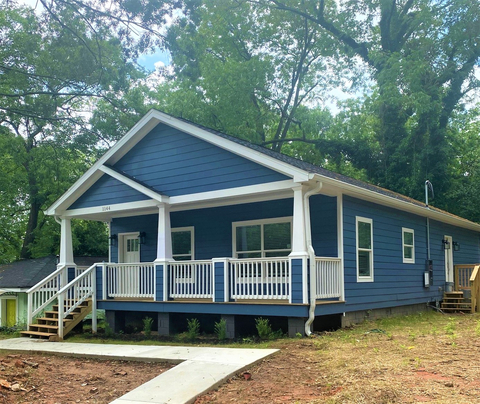Impact Housing Builds Homes for Displaced Victims of Hurricane Irma, Hurricane Michael
Impact Housing has completed 29 homes this year slated for delivery to victims of Hurricane Irma and Hurricane Michael through the Rebuild Florida Housing Repair and Replacement Program (HRRP). These are permanent homes built with modular construction methods to replace homes lost during these devastating hurricanes.
This press release features multimedia. View the full release here: https://www.businesswire.com/news/home/20220615006099/en/

Impact Housing modular home (Photo: Business Wire)
Georgia-based Impact Housing was engaged by Florida builders and contractors participating in HRRP to produce more than 40 quality-built homes. Impact Housing homes are built indoors in less than half the time of traditional outdoor construction and are transported to the homeowner’s address.
Impact Housing builds homes with the same materials as traditional site-built homes, complying with all local building codes. Modules are inspected in the factory by state authorities to confirm compliance with local construction codes, significantly streamlining the construction process.
One of the most valuable benefits Impact Housing offers is the ability to meet the strict building code requirements of Florida’s coastal areas out of a single construction facility. As homes are built for the different areas of Florida, materials are specified to meet local code requirements. In areas subject to storms with wind speeds exceeding 150 mph, windows are installed to meet code-mandated missile testing requirements.
According to Matt Calamari, managing director for Impact Housing, “One of the biggest benefits of modular construction is that we can design homes to any wind speed required. Most of our units are designed to withstand up to 150 mph wind speed. That covers every area of Florida other than south Florida. But we can plan and build for wind speeds to 180 mph to meet south Florida’s needs as well. Our plan sets are pre-approved by the state of Florida and can be customized for home replacement throughout the entire state with ease.”
Calamari adds, “It’s a huge benefit when building to meet these requirements. Otherwise, Rebuild Florida would have to go to each local contractor and say ‘will you build this house’ and go thru permitting one-off. Modular construction can address permitting across the board. It’s effective, scalable and expedites the process.”
Homes are shipped substantially complete, including all appliances, flooring, plumbing and exterior siding. The homes will be delivered to areas that are still recovering from hurricane damage, including the Marco Island area, the Florida panhandle, and the Florida Keys. When delivered, local contractors secure the homes on foundations and connect utilities. Once sited, modular homes are indistinguishable from site-built homes constructed with traditional “sticks and bricks” methods.
While it has taken Rebuild Florida years to qualify families, secure funding, identify builders and contractors, and begin construction, modular housing has proven to be one of the fastest solutions available for replacing the homes lost to hurricanes. Modular housing employs an assembly line construction process in a climate-controlled factory environment. All homes are built as modular units at specialized stations, progressing station-by-station toward completion. The average modular home is produced in fewer than 10 days and ready to ship to displaced homeowners.
HRRP is a housing rehabilitation, reconstruction and replacement program that prioritizes the elderly, the disabled, and low-income families impacted by hurricane destruction. The program is a partnership between the Florida Department of Economic Opportunity (DEO) and the U.S. Department of Housing and Urban Development (HUD). Impact Housing is producing modular homes for families that qualified for the program as victims of Hurricane Irma, which made landfall in the Panama City area as a Category 3 hurricane, or Hurricane Michael, which impacted Marco Island as a Category 5 hurricane.
View source version on businesswire.com: https://www.businesswire.com/news/home/20220615006099/en/




